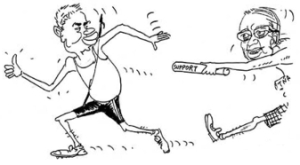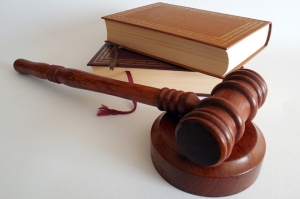January 19, 2019, 9:29 pm

After what is widely believed to be a draft Constitution was tabled before the Constitutional Assembly (CA) last week, the prime Minister who presented it in his capacity as the head of the Steering Committee of the CA, then immediately disowned it saying that it was his duty to table before the CA whatever came into their possession and that it was now the duty of the CA to take things forward from there. Even though the Steering Committee was supposed to steer the CA, he was in effect asking the latter to steer itself. When he made that request, 169 members of the 225 Constitutional Assembly were absent. The much-touted tabling of the Experts Committee report had got more than a two thirds majority in reverse with MPs making themselves scarce when the momentous moment came!
Even when questioned by the Opposition Leader whether he was tabling the draft of the Steering Committee, the Prime Minister dodged the question. Later, in Parliament he was to claim that there is no Constitution - not even the draft of a constitution. After nearly three years of deliberations, the purported CA is no closer to putting forward a draft constitution than they were on 9 March 2016, when this body was first instituted. We hear a few members of the UNP defensively saying that the proposed new Constitution will accord to Buddhism the foremost place as at present and that the unitary status of the country will remain unimpaired. Yet in the Experts Committee report, there are several alternative formulations of the provisions relating to the nature of the Sri Lankan state and the place accorded to Buddhism.

This incongruity between what appears in the Experts Committee report in black and the public pronouncements of various UNP politicians has already evoked a backlash from the Buddhist establishment. When the printed documents says one thing and the UNP politicians, promoting the new constitution, say something totally different, the suspicion naturally arises that some kind of perfidy is afoot. In the meantime, Some UNP politicians are either completely silent on a new constitution or are opposed to it.
Navin Dissnayake has gone on record as saying that there is no need for a new Constitution. Some backbenchers like Chaminda Wijesiri from Badulla have said that if there were provisions that were inimical to the country in the new Constitution they would not hesitate to vote against it. (At this point it may be pertinent to inform the reader that the Experts Panel Committee report that was tabled in the form of a draft constitution is the same document that was exclusively reported on and analysed in The Island in eight articles in July/August last year.)
TNA-driven constitutional reform
Why has this constitution-making process failed so spectacularly? We know that when the yahapalana candidate won the last presidential election in January 2015, that was on the solemn pledge given to the people that the executive presidential system would be abolished and the present proportional representation system would be changed and a constituency based electoral system introduced. Those were the only pledges that had any attraction to the larger body of the voting public. Where the present constitution-making process went wrong is that it was not driven by any of the principal partners in the government but by the Tamil National Alliance. The UNP and JVP inputs are restricted to the abolition of the executive presidential system, the new electoral system and the special disabilities imposed on the Rajapaksa family.
We can see the influence of the TNA in the two alternatives suggested as Clause 237(3) of the draft constitution. They both relate to a special provision allowing two or three adjoining Provinces to form one administrative unit with one elected Provincial Council, one Governor, one Chief Minister and one Board of Ministers. If such a merger is to take place it will have to be ratified by the people of each province at a referendum. The merger of the north and has been a shibboleth of the Tamil separatist lobby for decades. In the 1970s when the Tamil separatist cry became the Tamil mainstream, the merger of the north and east was not just an article of faith but also a practical necessity because a separate state would not be viable without the East. And in any case there was the reality that there were a large number of Tamils living in the East with the largest concentration being in the Batticaloa District. However, given the demographics of the Eastern Province, there isn’t a snowflake’s chance in hell of the people in that part of the country of voting at a referendum to merge with the north.
Today, the largest demographic group in the Trincomlaee and Ampara districts are Muslims with a significant Concentration in the Batticaloa District as well. The Tamils are in the majority only in the Batticaloa District. The proximate rivals of the Tamils in the East are the Muslims and not the Sinhalese. When M. L. A. M. Hisbulla was appointed the Governor of the East, the Tamils staged a hartal. There were reports of a few minor incidents such as a Muslim owned eatery being attacked in Batticaloa and tyres burnt on the roads. This was despite the fact that Hisbulla has a history of getting on well with Pillaiyan the first Tamil Chief Minister of the East. He is not known to have taken a combatively anti-Tamil stance either.
The merger of the north and east can never happen through democratic means. Then why include such a thing in the new draft Constitution? TNA MP M. A. Sumanthiran was shown speaking at a public rally stating that their stance was that the north and east should be merged and that there was a provision enabling this to take place in the Constitution. Given the chance that there is very little chance of this taking place in reality, why does the separatist/federalist lobby keep harping on this merger of the north and east? If the Tamil people of the East were told that Sri Lanka was to be turned into a federal state with nine semi-independent provincial units which was to have complete and unfettered control over everything that related to the day to day lives of the people, they would be among the front ranks of those demanding the retention of the unitary state because of their unwillingness to live under Muslim rule in the east.
Due to voting patterns, political party alliances and the distribution of population among the three districts, Muslims get a larger number of representatives elected to the provincial council even though Tamils still outnumber Muslims in the province as a whole. The only reason why the Tamil people of the east have not already joined the pro-unitary state camp is because of this hope held out of a merger of the north and east however unlikely that was. This in a way, shows how north-centric Tamil politics is, with the Tamils of the east being willing dupes in this deception. The Tamil politicians of the north desire self rule, and in order to achieve that they are willing to place the Tamils of the east under Muslim domination and the Tamils of the east, who while rebelling against Muslim domination, are still willing to be misled or mesmerized into thinking that the east will one day be merged with the north to create a Tamil majority unit.
This whole exercise seems to be based on self deception. On the one hand, the Tamil people of the east seem to be hoping for a miracle that will enable the east to be united with the north. The politicians of the north are also hoping for a miracle that will produce the same result because all talk of a Tamil homeland or an area of habitation of Tamils will go up in smoke without the east being a part of it. So in a way, all these parties are caught in a bind. The most honest and practicable demand put forward was by the Tamil United Liberation front in 1972 and which was pursued by the LTTE later over four - a separate Tamil state comprising of the northern and eastern provinces. The struggle to achieve the status of an independent state was pursued by violent means. When you look at it logically, there is no way to pursue the goal of achieving a separate state except through violence.
The moment you try to achieve such a goal through democratic means, a whole lot of dishonest posturing comes in which finally has the result of undermining the whole endeavor. When you try to achieve a separate state or something coming close to it, the most practical demand would be to ask for just two units - one for the Sinhalese outside the north and east and one for the Tamils in the north and east. Instead of asking for a two state solution, the Tamil lobby tries to sell separatism and federalism to the whole country by making each province a virtually independent self governing unit of administration. There is a whole lot of verbiage about the devolution of power being the best way for the people to be governed but the actual motivation comes from a tiny minority of Tamil politicians who want a separate Tamil state.
Using Sinhala leaders
When you try to achieve this Tamil state through democratic means, you come up against some snags. For some reason, nobody seems to be able to honestly ask for a self governing ethnic Tamil unit probably because that would be unfashionably ethno-centric. Even in the 1950s, when this idea of a separate Tamil state first came to the fore, there was this unwillingness to appear to be ethno centric. Even at that time, in order for the Tamils to have a separate self governing unit, the other provinces that were not asking for provincial self government were to be given such self governing units whether they liked it or not. This was the same attitude that governed the actual implementation of provincial councils in the 1980s. In India the states were created on the basis of linguistic units and having separate states for such units made sense. In Sri Lanka, if self governing units were formed on the basis of language there would be only two - one for the northern and eastern provinces and another for the Sinhala majority provinces.
But creating two states was seen to smack of separatism. So, in order to show that the separatists were not actual separatists but those who were advocating a superior form of government which will benefit the Sinhalese as well as the Tamils, all of us have to subscribe to this fiction that having nine devolved units is better than having a unitary state. If we suppose for a moment that what Sumanthiran advocates comes true and that after the country is broken up into nine separate federal units, the east decides to merge with the north, then the Tamils will be living in a unitary state while the Sinhalese will be living in eight semi independent federal states! What kind of a joke will that be? Just like the Sinhalese, the Tamils, too, aspire to a unitary state. That is why Sumanthiran is so obsessed with merging the north and east.
All this talk of devolving power to nine federal units is to give respectability to their separatist demand for a sovereign state and to make it appear more acceptable. So, everybody is conning everybody else here and the sooner we realize it, the better.
If by some chance the constitutional proposals they are advocating go through and the provision for the merger of the north and east does not go through as hoped for, what happens then? The likelihood of the people of the east voting to merge with the north is virtually non existent. If the Tamil people of the east end up having to live under a Muslim Chief minister for the rest of their lives, they are soon going to start clamouring for the restoration of the unitary state and the abolishing of the federal units altogether. Perhaps, it is time for the Tamil leadership of the north to realize that following the death of Prabhakaran the project to form a separate state is dead.
After the death of Prabhakaran, the TNA seems to have hit upon the strategy of using Sinhala leaders to achieve their objectives. At the 2010 presidential election they voted for Sarath Fonseka mainly to take revenge on Mahinda Rajapaksa. But that did not work out, and in 2015 they voted for President Maithripala Sirisena. That was partially successful in the sense of being able to oust the Rajapaksas. But their overall objective failed. President Sirisena has now parted company with the UNP-TNA-JVP collective and aligned himself with the Rajapaksa camp once more. In fact, he is playing a decisive role in preventing the UNP-TNA-JVP combine from cobbling together a two thirds majority in parliament by refusing to appoint any member of the SLFP who joins the UNP government as ministers.
That is not all. The very UNP that the TNA so assiduously supported and helped in a very decisive way during the political crisis after October 26 last year, is now dragging its feet on the mater of Tamil aspirations. The Prime Minister is blowing hot and cold. He disowns the TNA prompted constitutional proposals and then when he is threatened with the withdrawal of support by the TNA, he mumbles a few words about the constitution. Then the UNP sends delegations to meet the Mahanayake Theras to convince them that the UNP is not going to promulgate a new constitution. Thus far the rallying cry of the UNP is that there is no constitution and not even a draft and the papers that were tabled before the Constitutional Assembly were just suggestions.
If this is not a failure of the TNA project of using Sinhala leaders to achieve Tamil aspirations, what is it? If the TNA’s strategy of using Sinhala leaders to achieve Tamil aspirations is to succeed, the Sinhala leaders will have to be politicians who will be elected to power just once in order to grant the Tamil demands and then to disappear from the political scene much like some insects that give birth to offspring and then die. What is the likelihood of the TNA being able to find a Parliament full of politicians who will come into power with their help, grant their demands and then lie down and die? There will be many Sinhala leaders eager to avail themselves of the TNA’s votes so as to come into power.
But after achieving the objective of capturing power, they will be racking their brains to devise schemes to dodge granting the TNA what it wants. The moment the UNP found itself back in the saddle with the help of the TNA after the attempt by President Sirisena to dismiss the UNP government and hold a general election, Champika Ranawaka made a special televised appeal stating that they do not have a majority in parliament and that being dependent on the TNA vote will be a politically costly exercise and that at least ten members of the SLFP should join them so as to enable them to carry on a viable government without the help of the TNA!
So long as the TNA persists in this attempt to use Sinhala leaders to achieve Tamil aspirations, they are destined to suffer one disappointment after another. They should realise that any politician who is willing to agree to anything in order to achieve power, will just as easily think nothing of using and then discarding the TNA. There is nothing called honour among opportunists. How many more of these fiascos can the TNA afford to suffer? In 2015, they got the Tamil people to vote for Maithripala Sirisena saying that if their Sinhala leader was elected, all Tamil aspirations would be met. Thereafter nothing happened. At the 2018 February local government elections, the votes received by the TNA declined by over one half in the Tamil heartlands of the Jaffna and Batticaloa districts.
The ITAK and its allies had never suffered such a decline since it was founded in the 1950s. They managed to get a Mayor elected in the Jaffna Municipal Council only with the help of the EPDP. They very leader that they got the Tamil people to vote for at the presidential elections in 2015 is now preventing the UNP from cobbling together a two thirds majority by refusing to give ministries to SLFP parliamentarians who defect. The behaviour of both Maithripala Sirisena and Ranil Wickremesinghe should show the TNA that this attempt to use Sinhala leaders to achieve Tamil aspirations is never going to work because after any leader takes the reins of power, all that he will be interested in is to stay there for as long as possible.
Before they get wiped out at the next election, the way the TNA can survive as a political entity may be by joining the UNP government as a coalition partner, becoming powerful ministers and delivering something to their people. If that is not possible because of the poisonous propaganda that the ITAK itself spread among the Tamil population to the effect that anybody who collaborates with the ‘Sinhala government’ in Colombo is a traitor to the Tamil cause; well then they are done for.
Courtesy: The Island 20 January 2019











